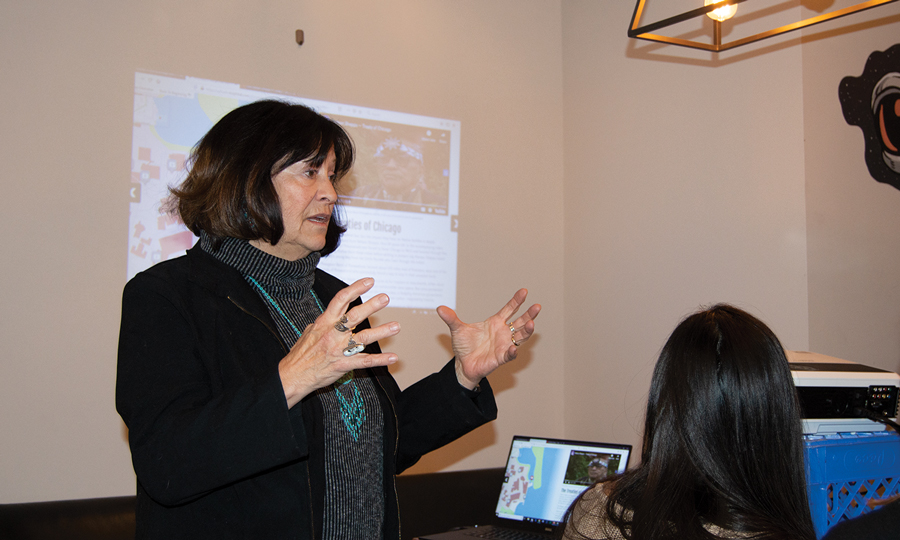Northwestern professor emphasizes Native history and inclusion
Anushuya Thapa/ The Daily Northwestern
Medill Prof. Patty Loew gives a talk at Reprise Coffee Roasters. She emphasized Native American history and inclusion.
January 17, 2020
Director for Native American and Indigenous Research and Medill Prof. Patty Loew emphasized the history of Native Americans in Evanston at a Wednesday event at Reprise Coffee Roasters.
The talk was the first of “Drinks and Thinks,” an event series sponsored by the cafe. Loew spoke to an audience of a dozen people as a member of the Bad River Band of Lake Superior Ojibwe. She recounted her encounters with various Native people and their stories as well as answered questions about Native American representation.
Loew discussed the sense of place central to the Native conception of community.
“History is not about time, it’s about place,” she said. “And every Native community that I’ve encountered has a place that is the essence of who they are. And everything worth remembering… is conceived of around that place.”
Hunter Owen, manager of Reprise Coffee Roasters’ branch on Main Street, said Loew embodied “the idea of connecting to your community,” which coincides with the cafe’s mission to be connected to the city. Despite the low turnout, Owens was not discouraged from hosting events like this in the future.
“It’s not like we filled the cafe up,” said Owens. “But I think that the people that were present were really engaged and super interested.”
During the talk, Loew also discussed her appreciation for oral tradition, developed from hearing about Evanston’s history from Native orators.
She played video clips of Native elders like Nelson Sheppo, who explained historical events such as the Treaties of Chicago and the Indian Removal Act of 1830, which forcibly relocated Natives to the west of the Mississippi River.
“These were forced marches,” said Loew. “In some cases they were marched in chains to the west.”
The talk also highlighted the history of successful Native Northwestern alumni like James Johnson, the first Native “All-American” football player and Carlos Montezuma (1889), the first Native American student to be admitted to NU and to earn a medical degree.
Loew spoke against a “monolithic notion” of who a Native person is, and said to avoid keeping them “frozen in the past.”
“Native people dynamic, we’re contemporary,” she said. “So I challenge (my students) to pull these stories forward.”
Though Loew said NU has “put effort in creating initiatives” to make Native people visible, she also acknowledged challenges present in their advancement.
Loew gave the example of a Navajo woman who began a presentation for a job at the University of Wisconsin-Madison by speaking of religious ceremonies involving trees before getting into her quantitative research. The audience of professors, which Loew said consisted mostly of white males, regarded her presentation as “unfocused” and “not mature enough.”
“Being willing to not just tolerate but embrace people who bring a different way of knowing…that’s where it’s not happening,” Loew said, referring to academia.
Nikki McDaid-Morgan, a Native American graduate student at Northwestern, said that she attended the event in support of Loew’s work and her nuanced storytelling.
“Every time (I hear Loew speak), I learn something new,” she said. “She’s really a great storyteller, which is part of our traditions.”
Email: [email protected]
Twitter: @AnushuyaThapa












